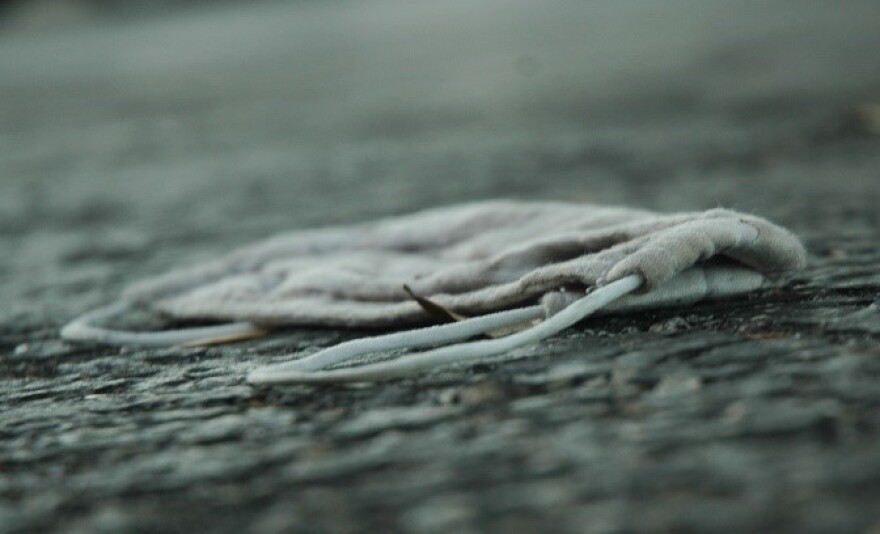Cigarette butts, empty cans and bottles have fouled Southwest Florida’s beaches, preserves and parking lots for a long time, and now a new scourge is being thrown into the mix: face masks once used to protect the wearer from Covid-19.
Masks come in many shapes, types and sizes, but one similarity is too many of them are being discarded everywhere except in a trash can.
Some were white, but have been trampled by dirty sneakers and driven over by car tires so many times the masks are spotted brown, flattened and stuck to the pavement. Others were light blue, but now white fuzz from the inside shows through and seagulls have been seen picking at the weave of polypropylene fibers wondering if it’s food. Red masks shine so brightly they beckon from far away, but are still not picked up and thrown away.
“Mask litter” is a worldwide problem with serious environmental ramifications.
A report published in the journal Nature Sustainability found a “skyrocketing” increase in mask littler in 14 months in 11 countries including the United States, a finding the study’s authors called “devastating.”
Mask “litter poses a big threat to the environment, potentially clogging drains and sewage systems; polluting rivers, lakes, streams, and oceans; entangling and poisoning wildlife; and leaching contaminants such as microplastics into the lower food chain,’ wrote Mary Van Beusekum, who summarized the report for the University of Minnesota’s Center for Infectious Disease Research and Policy.
The study’s authors found that in the four months prior to March 2021, which is when the World Health Organization declared COVID-19 a global health emergency, the percentage of litter made up by masks, anti-virus wipes and plastic gloves was unchanged from the past at about .015 percent of all trash. After the WHO’s declaration, mask litter alone increased 9,000 percent from March to October.
“It’s the first bit of research I’ve ever done out of annoyance and anger,” said Keiron Roberts, a faculty member of the School of Civil Engineering & Technology at the University of Portsmouth in England and the author of the study. “Why did we drop this on the floor? Surely people are aware this is a pandemic and this is potentially a contaminated item and I’m seeing it dropped around in car parks, outside of shops, outside of people’s homes. Why are we seeing it here?
Roberts reported a host of ways face masks can harm the environment. Masks washed into sewer drains can create blockages that could back up sewage systems. Animals can become entangled in the elastic straps or choke on the masks. If swallowed, creatures could die from malnourishment as the non-digestible plastics in the masks accumulate inside their stomachs.
As the masks break down due to weathering they dissolve from macro-plastics to micro-plastics to nano-plastics. Then they can enter the lower food chain and have toxicological effects including the leaching of metals.
"Our results suggest that, alongside addressing the threat to human health, targeted national-level pandemic responses are also necessary to address the threat to environmental health posed by related litter," Roberts wrote. "As it is likely that higher mask use will continue following the immediate health pandemic, such responses must be sustained. “
Roberts and his research team used a database that collects real-time reports on what types of litter people find all over the planet. Volunteers take a photo of the trash, note where it was found, and send the information to the database via cell phone.
Countries surveyed in the study were the United States, the United Kingdom, Canada, Australia, Belgium, France, Germany, the Netherlands, New Zealand, Spain, and Sweden. The report was published in December.
“Certainly, educational awareness programs are an important aspect of addressing the problem of face masks discarded anywhere but in a garbage container,” Roberts said. “We’ve all become essentially vision blind from the bottles, the crisp packets, the cans and everything else and now we are going ‘hang on a second I can see a mask.’ Because it’s new we’re seeing it.”
Should it really take international education efforts to instill in people that harm is being done to the environment when people do not put trash in a trash can?
The answer, which now includes used face masks, is the same all over the planet: apparently so.
Environmental reporting for WGCU is funded in part by VoLo Foundation, accelerating change and global impact by supporting science-based climate solutions, enhancing education, and improving health.





